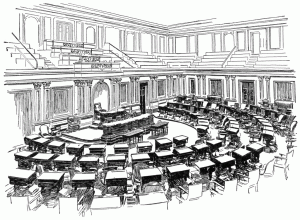As I have been writing on the rhetoric of vice presidential candidates and their communication during the election process, I have started to wonder what their role actually entails once their running mate is elected into office. What are the VP candidates responsible for exactly and why does it seem that they don’t communicate with the public quite as much as the president and other politicians do? I decided to conduct a little research to find out.
I discovered that historically, the role of the VP has slightly changed over the years and varies from VP to VP. Once a VP is selected to run alongside the presidential nominee, they appear on advertisements of the campaigning president. It has also been said that the VP nomination can sometimes make or break a presidential candidates potential for winning the election. As you don’t hear from the VP as much during the election process and especially after, you still see their name alongside their running mate on posters, stickers, buttons, etc. This alone is rhetoric as their nomination functions to communicate to the audience in a way that supports their running mate. It is all presidential nominees hopes that their VP selection compliments their running position and the audience understands and views the nomination in a positive, supportive way to the potential presidential candidate. The communicative function of the VP during the election process is to better express this rhetoric of the president and ensure their communicative and campaigning function is carried out with support. But what happens after the election is won?
After the election is won, one of the VP`s main functions is to preside over the Senate and oversee various operations associated with that role, while accompanying the president and serving as a ceremonial assistant to them. A lot of times, it has also depended on their involvement before and their relationship with the president at the time. It seems that their communication once elected into office is actually more internal as they act as the preceding officer of the Senate. As their main power is the ability to cast votes responsible for tie-breaking decisions among the Senate, their main communicative function is to understand the people and support the best decisions for them while presiding over the Senate to make those tie-breaking decisions based on the communication of the people and what may be best for them.
and their relationship with the president at the time. It seems that their communication once elected into office is actually more internal as they act as the preceding officer of the Senate. As their main power is the ability to cast votes responsible for tie-breaking decisions among the Senate, their main communicative function is to understand the people and support the best decisions for them while presiding over the Senate to make those tie-breaking decisions based on the communication of the people and what may be best for them.
I feel that is important to note that their job is important and although they may not communicate as much with the American people once in office, their role is still an important part to the functioning of our political system. As they communicate more internally, the rhetoric of their communication with the Senate indeed reflects decisions that are made and how our political system functions, even if we do not hear it. Check out this short video to find out more! Comment your thoughts below! What is your opinion on their name appearing on all advertisements during campaigning processes but not hearing from them as much after? If you have had experience with hearing more about VP`s after elections, I`d for you to share examples of their communication that is not so internal.
Sources:
http://www.livescience.com/5113-vice-president.html
https://www.quora.com/What-does-the-Vice-President-of-the-United-States-do
http://www.scholastic.com/teachers/article/presidents-and-vice-presidents-jobs
http://people.howstuffworks.com/vice-president4.htm
________________________________________________________
Erin Shattles
